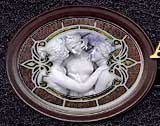|
Literary Commentary: Sir Gawain
Thank goodness, perhaps, that the author chose not to describe certain unnecessary details of
Sir Gawain and the Green Knight, for that might have "taxed our wits" to keep up. As it
was, near the beginning, I felt a little overwhelmed by how much adoration the narrative
lavishes upon the feast and Arthur's court. Keeping in mind that this piece was written a century
and a half after knights had petered out, glorifying them as we Americans did our Western heroes,
I couldn't help but sense a near-homoerotic hero worship in the physical descriptions of the
knights and the Green Knight, while passing over the ladies without much more mention than that
they were unsurpassingly beauteous. It took until the challenge of the Green Knight to absorb
me.
I enjoyed the use of alliterative verse, which I had not encountered often before (but have since
tried to remedy). Each stanza ending with its bob and wheel reminded me of certain lines from
Tolkien's more humorous poetry; Tolkien doubtless took inspiration from the classic tales. I
noticed particularly that in the telling, the point of view of the narrative changed. It
naturally concentrated most often on Gawain, but swerved from his avoidance-of-cuckolding
exploits to the details of the host's hunt, and at first I strove to figure out why so much
attention was spent on how each beast was taken. Delving into further research by more learned
students than I indicated that the beasts chosen (fox, boar) reflected the method by which the
host's lady tried to seduce the good knight. I noticed also that this period was still caught
between the concept of an ancient, magical pagan world and the new Christian one. Christian
worship is the new "Truth", but there is still an automatic acceptance of pagan supernaturalism;
as the Green Knight calmly picks up his severed, speaking head and goes on about his business,
there is some staring, and some who quail before him, but there isn't the sheer unbelieving shock
one might expect, and it is laughed off afterwards. (The idea, though, of his taking his head by
the hair and bursting out upon his horse, must have influenced stories such as "The Legend of
Sleepy Hollow"!)
I like Gawain. He is among the most famous of Arthur's knights, but calls himself the lowliest.
His humility is his greatest virtue. It's odd that this work chose not to tell a tale of striving
against villainy and succeeding, culminating in happy pride and satisfaction, but instead ends
with a penance, as Gawain's shame in preserving his own life (albeit a justified thing to do in
modern eyes) takes his success down a notch. Then again, it isn't so odd: Gawain strove to be
greater than the faulty human he is fated to be. It becomes a morality lesson, a challenge for
chivalry; Gawain's story is now an object to look up to and admire, rather than a tale of how
cleverly our protagonist beat the bad guy.
For me, I don't see his use of the girdle as a breach of contract. The Green Knight conveniently
didn't mention his particular supernatural immunity before issuing his challenge, therefore I see
no weakness in Gawain accepting a bit of ethereal armor. I guess, though, that Gawain's failure
to mention the girdle to his host when exchanging their "winnings" of the day is the real
subtraction from honor. However, the fact that Gawain wears it as a symbol of shame shows his
virtue. Bertilak the Green Knight surprises us with his goodwill by sparing and forgiving Gawain,
which makes me wonder about his relationship with or allegiance to Morgan le Faye, who is after
all the nemesis of Arthur's court. Was she happy with this outcome, or was she defeated in this
round? Did Gawain win or lose? To Gawain, at least, it seems he lost.
For Reference:
Sir Gawain and the Green Knight
David Elsensohn, March 2005
Return to Essays
|

